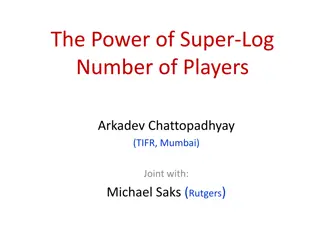
Unique Arduino Dice Programming for Fun
Explore a creative Arduino project involving dice programming to turn LEDs on and off based on dice rolls. Learn about hardware components, code structure, and memory usage. Get an insightful look into creating functions for different sides of a dice and understand the Arduino memory specifications.
Download Presentation

Please find below an Image/Link to download the presentation.
The content on the website is provided AS IS for your information and personal use only. It may not be sold, licensed, or shared on other websites without obtaining consent from the author. Download presentation by click this link. If you encounter any issues during the download, it is possible that the publisher has removed the file from their server.
E N D
Presentation Transcript
Programkd //Pin to to turn dice on & off int button = 2; //LED for DICE int bottomLeft = 3; int middleLeft = 4; int upperLeft = 5; int middle = 6; int bottomRight = 7; int middleRight = 8; int upperRight = 9; pinMode(button, INPUT); Serial.begin(9600); randomSeed(analogRead(0)); } void loop(){ //Read our button if high then run dice if (digitalRead(button) == HIGH && state == 0){ state = 1; randNumber = random(1, 7); delay(100); Serial.println(randNumber); int state = 0; long randNumber; //Initial setup void setup(){ pinMode(bottomLeft, OUTPUT); pinMode(middleLeft, OUTPUT); pinMode(upperLeft, OUTPUT); pinMode(middle, OUTPUT); pinMode(bottomRight, OUTPUT); pinMode(middleRight, OUTPUT); pinMode(upperRight, OUTPUT);
Programkd if (randNumber == 6){ six(); } if (randNumber == 5){ five(); } if (randNumber == 4){ four(); } if (randNumber == 3){ three(); } if (randNumber == 2){ two(); } if (randNumber == 1){ one(); } delay(5000); clearAll(); state = 0; } } //Create a function for each of our "sides" of the die void six() { digitalWrite(bottomLeft, HIGH); digitalWrite(middleLeft, HIGH); digitalWrite(upperLeft, HIGH); digitalWrite(bottomRight, HIGH); digitalWrite(middleRight, HIGH); digitalWrite(upperRight, HIGH); } void four() { digitalWrite(upperLeft, HIGH); digitalWrite(bottomLeft, HIGH); digitalWrite(upperRight, HIGH); digitalWrite(bottomRight, HIGH); } void three() { digitalWrite(upperLeft, HIGH); digitalWrite(middle, HIGH); digitalWrite(bottomRight, HIGH); } void five() { digitalWrite(upperLeft, HIGH); digitalWrite(bottomLeft, HIGH); digitalWrite(middle, HIGH); digitalWrite(upperRight, HIGH); digitalWrite(bottomRight, HIGH); } void two() { digitalWrite(bottomRight, HIGH); digitalWrite(upperLeft, HIGH); } void one(){ digitalWrite(middle, HIGH); }
Programkd void clearAll(){ digitalWrite(bottomLeft, LOW); digitalWrite(middleLeft, LOW); digitalWrite(upperLeft, LOW); digitalWrite(middle,LOW); digitalWrite(bottomRight, LOW); digitalWrite(middleRight, LOW); digitalWrite(upperRight, LOW); }
Arduino memory FLASH 32kB, stores the compiled sketch, 10.000 write cycles RAM 2kB (volatile) EEPROM 1kB, 100.000 write cycles After compile: Sketch uses 444 bytes (1%) of program storage space. Maximum is 32256 bytes. Global variables use 9 bytes (0%) of dynamic memory, leaving 2039 bytes for local variables. Maximum is 2048 bytes.
EEPROM EEPROM Electrically Erasable Programmable Read-Only Memory Non-volatile (data stays) Developed in 1973, patented by NEC in 1975 Two transistors per bit (SLOW) Serial or parallel data bus Microcontroller - Internal EEPROM
EEPROM ROM burned at factory EPROM user programmed, UV light, special EPROM burner EEPROM electrically erased, no burned, in- circuit programming Limited number of re-writes Typical 100.000-2.000.000 Data remains 10 years at room temperature
EEPROM pot update #include <EEPROM.h> int address = 0; void setup() { } void loop() { int val = analogRead(0) / 4; EEPROM.update(address, val); address = address + 1; if (address = EEPROM.length()){ address = 0; } delay(100); }
EEPROM pot read void loop() { // read a byte from the current address of the EEPROM value = EEPROM.read(address); #include <EEPROM.h> // start reading from the first byte (address 0) // of the EEPROM int address = 0; byte value; Serial.print(address); Serial.print("\t"); Serial.print(value, DEC); Serial.println(); void setup() { // initialize serial and wait for port to open: Serial.begin(9600); while (!Serial) { } } address = address + 1; if (address == EEPROM.length()) { address = 0; } delay(50); }
EEPROM test #include <EEPROM.h> void loop() { // put your main code here, to run repeatedly: Serial.print("EEPROM address 0, stored value: "); Serial.println(EEPROM.read(0)); Serial.print("EEPROM address 1, stored value: "); Serial.println(EEPROM.read(1)); Serial.print("EEPROM address 2, stored value: "); Serial.println(EEPROM.read(2)); Serial.print("EEPROM address 3, stored value: "); Serial.println(EEPROM.read(3)); Serial.print("EEPROM address 1025, stored value: "); Serial.println(EEPROM.read(1025)); delay(2000); Serial.println(" "); while(true); } void setup() { // put your setup code here, to run once: Serial.begin(9600); EEPROM.write(0, 100); EEPROM.write(1, 'A'); EEPROM.write(2, 255); EEPROM.write(3, 260); EEPROM.write(1025, 10); delay(3000); }
Program code // EEPROM dice // Roll the dice 100 times, store each roll into EEPROM (address 0-99). // Calculate which number occurred how many times. #include <EEPROM.h> if (currentNum==3){ diceRolledNumbers[2]++; } if (currentNum==4){ diceRolledNumbers[3]++; } if (currentNum==5){ diceRolledNumbers[4]++; } if (currentNum==6){ diceRolledNumbers[5]++; } } byte diceRolledNumbers [6]={0,0,0,0,0,0}; void setup() { randomSeed(analogRead(A0)); Serial.begin(9600); } void loop() { for(int i=1; i<101; i++){ byte currentNum = random(1, 7); EEPROM.write(i-1, currentNum); if (currentNum==1){ diceRolledNumbers[0]++; } if (currentNum==2){ diceRolledNumbers[1]++; }
Program code for (int i=1; i<101; i++){ Serial.print(EEPROM.read(i-1)); Serial.print(""); if ((i%20)==0){ Serial.println(" "); } } Serial.println(""); for (int j=1; j<7; j++){ Serial.print("Number "); Serial.print(j); Serial.print(" occured "); Serial.print(diceRolledNumbers[j-1]); Serial.println(" times."); } Serial.println(""); int rollSum = 0; for (int k=1; k<7; k++){ rollSum=rollSum+diceRolledNumbers[k]; } Serial.println(diceRolledNumbers[0]); Serial.println(diceRolledNumbers[1]); Serial.println(diceRolledNumbers[2]); Serial.println(diceRolledNumbers[3]); Serial.println(diceRolledNumbers[4]); Serial.println(diceRolledNumbers[5]); while(true); }






